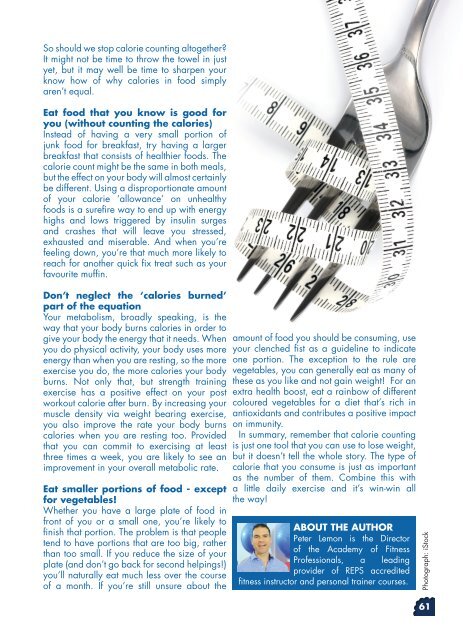Obese Britain Summer 2015.pdf
A magazine about Healthy Living, Weight Loss, Exercise and Dieting. Distributed with the Guardian on the 27th June 2015 www.obesebritain.com
A magazine about Healthy Living, Weight Loss, Exercise and Dieting. Distributed with the Guardian on the 27th June 2015 www.obesebritain.com
You also want an ePaper? Increase the reach of your titles
YUMPU automatically turns print PDFs into web optimized ePapers that Google loves.
So should we stop calorie counting altogether?<br />
It might not be time to throw the towel in just<br />
yet, but it may well be time to sharpen your<br />
know how of why calories in food simply<br />
aren’t equal.<br />
Eat food that you know is good for<br />
you (without counting the calories)<br />
Instead of having a very small portion of<br />
junk food for breakfast, try having a larger<br />
breakfast that consists of healthier foods. The<br />
calorie count might be the same in both meals,<br />
but the effect on your body will almost certainly<br />
be different. Using a disproportionate amount<br />
of your calorie ‘allowance’ on unhealthy<br />
foods is a surefire way to end up with energy<br />
highs and lows triggered by insulin surges<br />
and crashes that will leave you stressed,<br />
exhausted and miserable. And when you’re<br />
feeling down, you’re that much more likely to<br />
reach for another quick fix treat such as your<br />
favourite muffin.<br />
Don’t neglect the ‘calories burned’<br />
part of the equation<br />
Your metabolism, broadly speaking, is the<br />
way that your body burns calories in order to<br />
give your body the energy that it needs. When<br />
you do physical activity, your body uses more<br />
energy than when you are resting, so the more<br />
exercise you do, the more calories your body<br />
burns. Not only that, but strength training<br />
exercise has a positive effect on your post<br />
workout calorie after burn. By increasing your<br />
muscle density via weight bearing exercise,<br />
you also improve the rate your body burns<br />
calories when you are resting too. Provided<br />
that you can commit to exercising at least<br />
three times a week, you are likely to see an<br />
improvement in your overall metabolic rate.<br />
Eat smaller portions of food - except<br />
for vegetables!<br />
Whether you have a large plate of food in<br />
front of you or a small one, you’re likely to<br />
finish that portion. The problem is that people<br />
tend to have portions that are too big, rather<br />
than too small. If you reduce the size of your<br />
plate (and don’t go back for second helpings!)<br />
you’ll naturally eat much less over the course<br />
of a month. If you’re still unsure about the<br />
amount of food you should be consuming, use<br />
your clenched fist as a guideline to indicate<br />
one portion. The exception to the rule are<br />
vegetables, you can generally eat as many of<br />
these as you like and not gain weight! For an<br />
extra health boost, eat a rainbow of different<br />
coloured vegetables for a diet that’s rich in<br />
antioxidants and contributes a positive impact<br />
on immunity.<br />
In summary, remember that calorie counting<br />
is just one tool that you can use to lose weight,<br />
but it doesn’t tell the whole story. The type of<br />
calorie that you consume is just as important<br />
as the number of them. Combine this with<br />
a little daily exercise and it’s win-win all<br />
the way!<br />
ABOUT THE AUTHOR<br />
Peter Lemon is the Director<br />
of the Academy of Fitness<br />
Professionals, a leading<br />
provider of REPS accredited<br />
fitness instructor and personal trainer courses.<br />
Photograph: iStock<br />
61



